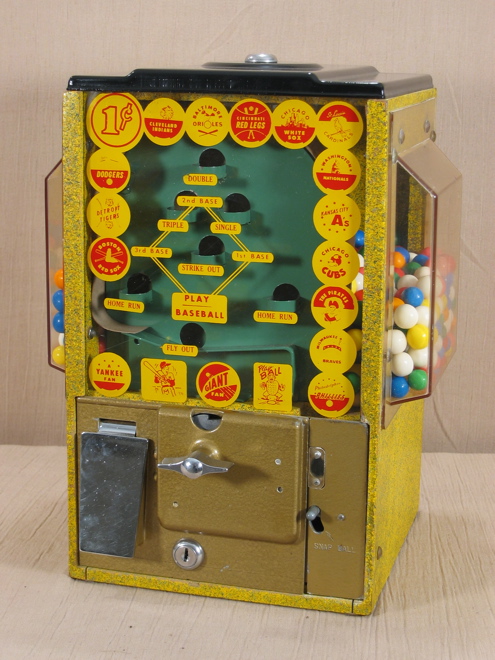___________________________________________________________________________________________
Victor Baseball

___________________________________________________________________________________________

Victor Vending Corp., Chicago, IL, c. 1950's, 14". This is a gumball flip machine fashioned along the lines of the Coast Basketball machine. I don't know which came first, but the concept is nearly identical between the two. The customer puts a penny into the slot and cranks the handle, and a gumball is deposited on top of the flip lever on the right side of the machine. The customer has to flip it up into the playing field and put it into one of the holes to get it. If he continues to miss then he doesn't get the gum; it sits on top of the flip lever and gets old and stale and discolored, and he has to go to another machine that doesn't require any skill beyond the ability to turn the crank.
Two versions of this machine are pictured in Silent Salesmen Too. They differ in the presence or type of side windows, and the decals adorning the front glass. On the machine above the plastic side windows jut out and give the machine greater capacity; on the other version the windows are either flat or the sides are solid; I can't tell from the straight-on shot in Silent Salesmen Too. According to that source the front glass on the machine above is older than the other version of front glass, which shows crouching players in the various positions around the diamond. The same machine was available in a football version and a "Ten Pins" bowling version, and the only thing different was the decal theme on the front glass.
The case on this machine is made of particle board painted a speckled pattern, which was an unusual construction material for a 1950's vendor. My first impression was that it's a pretty cheap (as in shabby) method of construction, but the case is solid and well-built so the material seems to have served its purpose. I think the 1950's started a more utilitarian era in vendor design, where manufacturing efficiency and cost were more important than the superior materials and artisanship that collectors would appreciate 50 or 100 years later. From a business standpoint I'm sure it was a smart move, but it made for generally less interesting machines.
The example above is 100% original except for maybe the paint on the lid. I don't see any sign of it being repainted, but it's perfect so I question its age. The whole machine is in outstanding condition, though, so it's possible.
___________________________________________________________________________________________
___________________________________________________________________________________________
©Small Vintage Vending 2003-2009